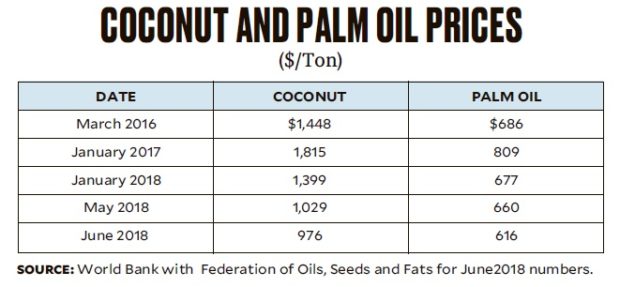Because the average farm gate price of one coconut has fallen by 64 percent from P12.50 to P4.50, our 3.4 million farmers are suffering. This is because a coconut farmer’s average annual income is only P20,000 a year. Since these farmers will now earn only P7,200 yearly, many are now cutting their coconut trees and selling them just to survive. Unfortunately, this jeopardizes the main source of their future income.
The argument given is that this is tough luck for the farmers, because market forces dictate their economic situation. The table shows that the world market price for palm oil largely influences the price of coconut oil.
We note that the price trend of coconut oil follows that of palm oil. However, the 30-percent decline in coconut oil price from January to June this year is far greater than the 9-percent drop in palm oil price. The 64-percent decline in the farm gate coconut price is far worse. A study should be done on why a coconut farmer suffers much more than others in the value chain. Improved potential efficiencies may be discovered and implemented to increase the benefits to the farmer.
An immediate solution should be done to address this coconut price crisis by merely implementing the Biofuels Act of 2006. This mandates that Coconut Methyl Ester (CME) should comprise 2 percent of our diesel, eventually rising to at least 5 percent. The 2-percent progression to the mandated 5 percent has been stalled for the last 12 years. This is bad for both the coconut farmers and the environment. As for the 3-percent CME impact on overall inflation, the computed P1 increase in today’s P44 diesel price will hardly make a dent.
In 2012, coconut farm gate price fell from P18 to P12. Agriculture Secretary Proceso Alcala then announced a planned larger share of CME for diesel. The coconut price went back to P18. Though the increased CME share was never implemented, the announcement was enough to result in the increased price.
A similar price announcement should be done today, and implemented soon. The total domestic diesel market is 7.2 billion liters. Increasing the CME share from 2 to 5 percent will mean increasing today’s CME demand from 144 million to 360 million liters. At present, 80 percent our coconut oil is geared for export and 20 percent for the local market. The 360 million liters for CME alone already exceeds the planned 240 million liters planned for total domestic use. This will surely increase the price of domestic coconut oil.
Our coconut farmers are the poorest in the country. Aside from the nonimplementation of the CME mandated increase, other factors have made the coconut farmers increasingly frustrated and angry. The P75-billion coconut levy is still unused. While support for rice exceeds P40 billion today, the Philippine Coconut Authority has received only P1.4 billion this year. This shows a decreasing budget trend from P4.9 billion in 2015 to an even lower P1.2 billion next year.
Short- and long-term measures should be implemented. More warehouses and buying stations, as well as better transport and logistics facilities, should be made accessible to farmers to increase their share in the value chain. More coconut processing into high value products should be done. Intercropping the largely idle 2 million coconut hectares can increase farmer income by at least five times at only P60,000 in investment per hectare per job.
It is time the undeserved suffering of coconut farmers be stopped with a decisive act of strong political will.


